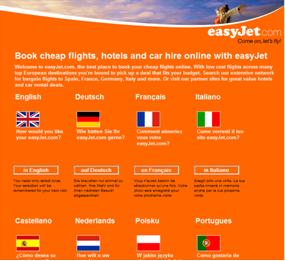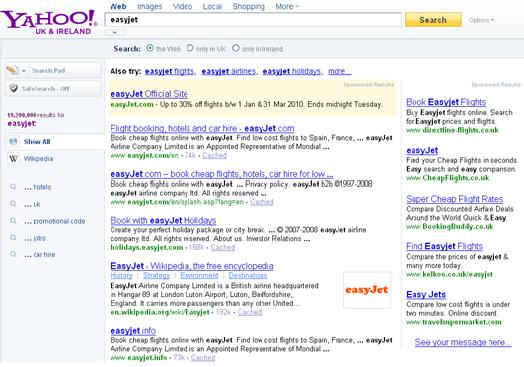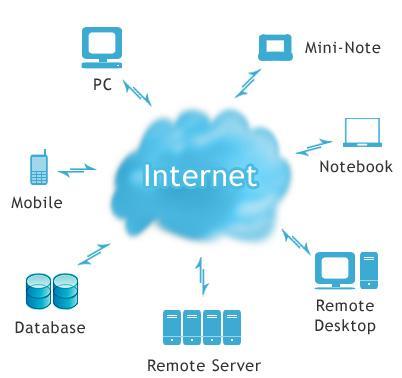Week 9 – Customer Relationship Management
November 20, 2009 at 11:29 pm | Posted in Week 9 | Leave a commentThis week’s task required me to generate a list of 12 key phrases, using Google, which best describes the e-commerce business, Easyjet. I started by using the website http://www.google.co.uk/sktool/#, this website initially helped me to determine which key phrases were best suited to easyjet and whether or not Google recognised them as being in their top 10 list, sponsored links or not at all. The screen shot below shows that I have entered easyjet.com as the website and in the key phrases or words box I have typed cheap airlines UK.

From this the following results were shown. By clicking on the blue link titled cheap airlines UK, the user is automatically taken to the Google page below. Taking into consideration at this moment, easyjet’s competitors, ryanair are a close second to easyjets first place spot at this particular time. This is heartening to see as in previous researches ryanair were usually placed before easyjet. “Cheap airlines UK” is most certainly a key phrase which I plan to use.
As we are now suffering in the winter weather I thought that a key phrase such as “winter seats” or “winter flights” would be appropriate for someone looking to get away for a winter break. By typing this into the Google keyword tool, I was not returned phrases which related to this search, however, it did recognise the search winter seats for particular flights during this season, therefore I have decided to use the phrase “Winter Flights to Europe”, and when the user clicks on the link they will be taken to easyjet’s website where they could book their winter break hassle free. The link which appeared for this search was a sponsored link.
Following this search, I continued to investigate via the “Google Insights for Search” tool. I chose 4 random key phrases which I thought most users would consider when looking for an airline that could provide them with a cheap flight. The 4 phrases which I used were, “low cost airlines UK”, “cheap flights to Europe”, “budget flights”, and “UK cheap flights”. I did a UK based search and each key phrase is separated into a regional interest. Overall, “UK Cheap Flights” is the most popular key phrase used in all regions. Notice it is the green line shown below.
Rather than using only Google, to search for key words and phrases I went on a hunt searching for various other websites related to finding keywords which would help me find words related to easyjet. From the 2 websites which I used, the first is, http://freekeywords.wordtracker.com/ and the second is http://www.keywordspy.co.uk/. Both these websites distributed different keywords which helped to improve my own ideas.
The following table shows the list of 12 keywords/phrases which I have chosen as I feel these are the best keywords best to describe my e-commerce site, easyjet.
KEY: Sponsored Link/Unsponsored Link
Week 8 – E-Marketing
November 11, 2009 at 2:20 pm | Posted in Week 8 | Leave a commentThis week’s assignment requires researching via a search engine, several keywords and phrases which I feel are related to easyjet. I am interested in what results are returned, i.e. what competitors are shown and how many paid links are used by easyjet.
I started this week’s assignment by first of all typing the word “easyjet” into the search engine, “Google”. As shown from the screen shot below, there are about 3,320,000 pages related to easyjet in some way. However, some websites use easyjet as a tag for their own website so that the many people surfing the net for easyjets services will perhaps view their sites also. Users must be careful though as some of these websites could cause harm to their computers with viruses etc.

When searching for easyjet on the internet it is very easy to retrieve your results. Below in the Google screenshot I am showing the first two links which both direct customers to the website. When selecting either of the two links from Google, I was directed straight to easyjet.com with no hassle whatsoever. The very first link on the Google webpage (easyjet Official Site) is paid for as it is a sponsored link and each time this link is clicked, easyjet are charged a sum of money. Also to the right hand side of the screenshot below, is another sponsored link where easyjet are featured via directline-flights. When this link is selected I am able to book a flight with easyjet through this website. As shown below, easyjet require the user to select which language they prefer to view their website in. Once chosen, your computer will remember this and you will not have to select this again. Following this, customers are then able to book their flights.


I have proceeded further by typing in key words to Google which I myself would relate with easyjet for example, cheap flights. Results have shown that when typing “Cheap Flights” into Google, it at first returns companies such as cheapflights.co.uk, skyscanner.co.uk and travelsupermarket.com before showing results for actual airline companies like easyjet. Nevertheless, the first thing I noticed when searching for easyjet was that their competition, aerlingus have a sponsored link at the top of the page which is a paid link by the company so that their website is shown before all their competition. Alongside aerlingus who have paid links are cheapflights.co.uk and aircanada.com. Next in line are ryanair who are placed just before easyjet with jet2 following behind, however the links to their websites are not sponsored links, and are just results shown by Google.
Using another key phrase, “cheap UK airlines”, describes easyjet, and also provides results via Google. However, as before, easyjet are not the first airline mentioned, aerlingus are again a paid link and are positioned first. Flybe, ryanair and flybmi are all featured airlines who are mentioned before easyjet. For easyjet it is a positive point that they are mentioned, however with four other airlines being mentioned before them, means that easyjet could be losing customers to the other airlines like ryanair for the simple reason that they are mentioned first.
On discovering this previous information, I decided to use the search engine to type in the names of all easyjets well known UK and Irish competitors. My results showed that when searching for results on aerlingus, easyjet had one paid link to their website, however, when searching this website just a few minutes before hand there was no mention of easyjets paid link, which leads me to believe that some paid links are shown at random on certain websites.

I have used easyjets slogan, “Come on let’s Fly” to test if it relates to easyjet via the Google search engine. As shown below it has related straight to easyjet as its first link and many links thereafter. I have tested this and it directs users straight to http://www.easyjet.com.

Using the search engine, “Yahoo”, I have established that there are more paid links along the right hand side than what there are on Google’s search engine. This to me shows that easyjet feel, Yahoo is a search engine which the majority of people use, however I would disagree as I would have thought Google was more popular than any. As Yahoo.co.uk is a UK and Ireland based website, easyjet, being a UK based airline may use Yahoo for this particular reason. What they perhaps do not realise is that when users use google.com, it automatically transfers to google.co.uk. meaning their paid links would still be shown.

Week 7 – Cloud Computing
November 5, 2009 at 11:11 pm | Posted in Week 7 | Leave a commentCloud Computing received its name from a typically inspired “spider diagram” in the shape form of a cloud image. This cloud is often used to symbolize the internet in flow charts and diagrams. Cloud Computing is a common term for anything that involves sending hosted services over the internet and these services are separated into the following three categories;
- Infrastructure-as-a-Service (IaaS) “Infrastructure as a Service is a provision model in which an organization outsources the equipment used to support operations, including storage, hardware, servers and networking components.”
- Platform-as-a-Service (PaaS) “is a model for delivering operating systems and associated services over the Internet without downloads or installation. PaaS is sometimes called “cloudware” because it moves resources from privately owned computers into the Internet “cloud.” ”
- Software-as-a-Service (SaaS) “Infrastructure as a Service is a provision model in which an organization outsources the equipment used to support operations, including storage, hardware, servers and networking components. The service provider owns the equipment and is responsible for housing, running and maintaining it. The client typically pays on a per-use basis.
A cloud can either be private or public. A public cloud sells services to anyone on the Internet, i.e. Amazon. (Currently, Amazon Web Services is the largest public cloud provider.) A private cloud is a proprietary network or a data centre that supplies hosted services to a restricted number of people. When a service provider uses public cloud resources to create their private cloud, the result is called a virtual private cloud. Private or public, the goal of cloud computing is to provide easy access to computing resources and IT services.
Cloud Computing has great cost benefits on offer as there is no software, hardware or infrastructure to buy and in most cases it uses a pay as you go system where you simply pay for what you use. The idea of cloud computing being cost effective is centred around peak usage for example, if a company website endures its busiest time of the year during the Christmas season then classically more computing power, more disk storage and more bandwidth would be needed. With the cloud, you only pay for the processing power, storage and bandwidth you need, resulting in that you do not have to pay for times when your business is inactive.
It is possible that within the next five years, almost 90% of all e-commerce businesses will be using some structure of cloud computing to enhance their services. Cloud Computing simply refers to what several e-commerce businesses have been doing for some time. More people are becoming aware of this, therefore more businesses are seriously taking into consideration the changeover.
Potential Benefits of Cloud Computing in E-Commerce
- Speed: Building your application in the cloud is five times faster and you can start taking orders in just a few short weeks.
- Customer Focus: Running your e-commerce business in the cloud helps make it easier to do business with customers by simplifying interactions and driving down transaction costs.
- Pay-as-you-go: This addresses businesses whose websites are busiest at certain times of the year and can work using a pay-as-you-go-approach. Thousands of new users can be added with no additional investment.
Potential Problems
Cloud Computing requires a constant Internet connection and is impossible if you are unable to connect to the Internet. Since the Internet is needed to connect to both, applications and documents, it is essential to have an Internet connection otherwise you can’t access anything, even your own documents. A dead Internet connection means no work and, in areas where Internet connections are few or unreliable, this could be a deal-breaker. When you’re offline, cloud computing simply doesn’t work.
Stored data might not be secure as with cloud computing, all data is stored outside the company. Do we know how secure is the cloud? Can unauthorized users gain access to your confidential data? These are questions that do not have specific answers. Cloud computing companies say that data is secure, but it’s too early to be completely sure of this. Only time will tell if data is secure in the cloud.
Supposedly, data stored in the cloud is unusually safe however stored data can be lost. On the off chance that your data goes missing, you have no physical or local backup. Put simply, relying on the cloud puts you at risk if the cloud lets you down.

www.searchcloudcomputing.techtarget.com/sDefinition/0,,sid201_gci1287881,00.html
www.webhostingunleashed.com/features/cloud-computing-benefits/







